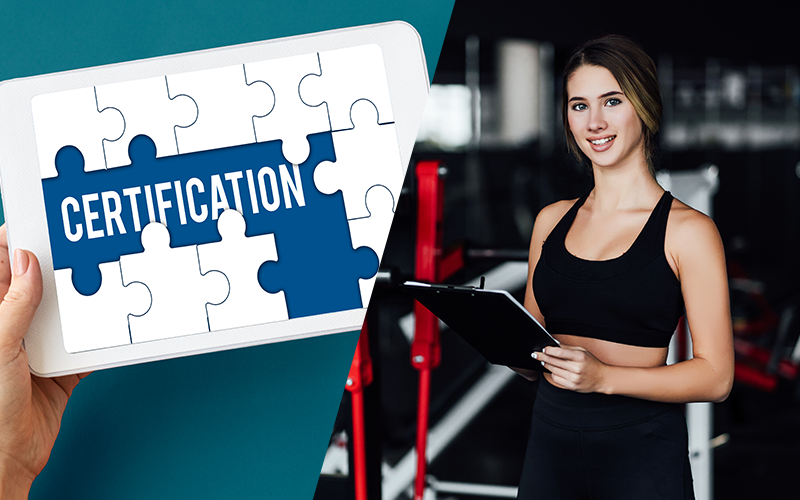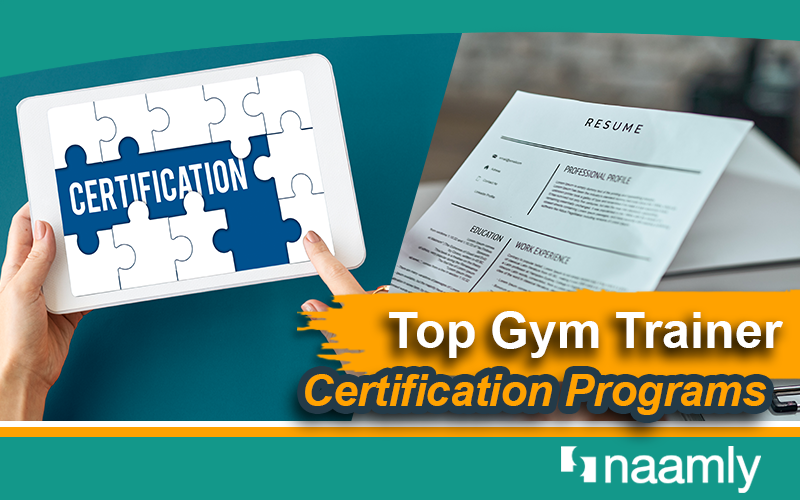When you’re looking to hire a new trainer, it’s tempting to just glance at their résumé, check for a certification, and move on.
But not all certifications — and not all trainers — are created equal.
Understanding gym trainer certifications is one of the smartest things you can do to build a stronger, safer, and more specialized team. Because the right certification doesn’t just show a trainer passed a test. It shows they invested in becoming the kind of coach your gym — and your clients — need.
Let’s take a closer look at what certifications really mean, which ones matter most, and how to use them to make better hiring decisions.

Before you even meet a candidate, their gym trainer certifications tell you a lot:
- Do they understand basic exercise science and client safety?
- Were they trained in program design or just how to lead a bootcamp?
- Are they qualified to work with your specific client population — general fitness, athletes, older adults, rehab clients, etc.?
Gym trainer certifications give you a first filter. They’re not the only thing you should look at, but they can give you confidence that the job candidate has the minimum training for safety, professionalism, and credibility.
If you find a candidate with the right certification for your gym’s ideal client, that could be where the magic begins.
Major Gym Trainer Certifications You Should Know
When you’re scanning résumés, these are some key names you should recognize in gym trainer certifications, and the special focus of each.
1. NASM (National Academy of Sports Medicine)
- Strengths: Corrective exercise, functional training, program design
- Best for: Trainers working with the general population or clients needing movement corrections
- Popular specializations: Corrective Exercise Specialist (CES), Performance Enhancement Specialist (PES)
2. ISSA (International Sports Sciences Association)
- Strengths: Flexibility, global recognition, holistic fitness education
- Best for: Trainers who want a broad, practical foundation in fitness, nutrition, and coaching
3. ACE (American Council on Exercise)
- Strengths: Client-centered coaching, behavior change, public health
- Best for: Trainers working with beginners, general population, or wellness-focused clients

4. NSCA (National Strength and Conditioning Association)
- Strengths: Athletic performance, strength and conditioning science
- Best for: Trainers coaching athletes, high performers, or team sports populations
5. ACSM (American College of Sports Medicine)
- Strengths: Exercise physiology, medical fitness, clinical populations
- Best for: Trainers working with post-rehab clients, seniors, or those managing chronic conditions
6. NCSF (National Council on Strength and Fitness)
- Strengths: Strength training, practical application, corrective exercise
- Best for: Trainers who want strong foundational coaching skills, especially for general fitness clients
7. Other Specialized Organizations
- FMS (Functional Movement Systems) – Focuses on movement screening and injury prevention
- MedFit Network Certifications – Specializes in training for chronic conditions and medical fitness
- Precision Nutrition Certification – Industry leader in fitness-focused nutrition coaching
Niches in Gym Trainer Certifications: Match Your Staff to Your Clients
The explosion of specialty gym trainer certifications isn’t just a trend — it’s a huge opportunity. Once you know your avatars, or your ideal customers, consider looking for trainers certified specifically to meet those needs. Some of the above organizations have specialty certifications. Here are some more major niches and certification programs. (This list is meant to be more illustrative than definitive.)
Promote the news that you have hired a trainer with any of these specialty gym trainer certifications. It’s a confidence booster for your prospects and sets you apart from your competition.

1. Older Adults (50+)
With an aging population, there’s a growing demand for trainers skilled in working with older adults. These certifications focus on improving functional fitness, balance, and overall quality of life for people as they continue to age. It can be helpful for gyms serving active agers or focusing on fall prevention, balance, and strength for independence.
- Functional Aging Institute (FAI) – Functional Aging Specialist Certification, recently acquired by ISSA. This certification provides in-depth training on functional training strategies and movements tailored for older adults.
2. Prenatal and Postnatal Clients
If your gym works with young moms, these gym trainer certifications ensure safety through all stages of pregnancy and recovery. Training pregnant and postpartum women requires specialized knowledge to ensure safety and effectiveness. These certifications cover physiological changes during pregnancy, appropriate exercise selection, and postpartum recovery strategies.
- American Fitness Professionals & Associates (AFPA) – Pre & Postnatal Fitness Specialist Certification
- ISSA – Prenatal and Postnatal Fitness Instructor
3. Youth and Teenage Athletes
Good for gyms offering youth athletic development or strength and conditioning for school-age athletes. If you work with young athletes, you need someone on staff who understands developmental stages and age-appropriate training.
- AFPA – Youth Strength Conditioning Specialist
- ISSA – Youth Fitness Certification
4. Clients with Disabilities or Special Needs
Adaptive fitness certifications prepare trainers to work with people who have physical, cognitive, or developmental disabilities, focusing on inclusive and safe exercise programming.
- Adaptive Training Academy (ATA) – Adaptive & Inclusive Trainer Certificate
- ACSM/National Center on Health, Physical Activity and Disability (NCHPAD) – Inclusive Fitness Specialist Certificate
5. Clients with Chronic Conditions
Fitness can help treat symptoms of some chronic health conditions, including type 2 diabetes and Parkinson’s disease, just for starters. These gym trainer certifications can be perfect if your gym markets to post-rehab, diabetic, cardiac, or other medically complex populations.
- ACSM – Certified Clinical Exercise Physiologist
- MedFit Network Certifications – Various chronic disease and rehab-related certifications
6. General Youth Fitness (Beyond Athletes)
Good for gyms that want to build community programs for kids focused on health, not just sports performance.
- ACSM – Youth Fitness Specialist
- IYCA (International Youth Conditioning Association) – Youth Fitness Specialist Certification
7. Functional Movement & Injury Prevention
Critical for any gym wanting to keep clients moving well — and pain-free — longer.
- FMS (Functional Movement Systems) – Level 1 and Level 2 Certifications
- NASM – Corrective Exercise Specialist (CES)
8. Nutrition-Focused Coaching
If your gym offers lifestyle or total transformation coaching, having trainers who can address nutrition is a big asset.
- Precision Nutrition – Level 1 and Level 2
- ISSA – Certified Nutrition Coach
How to Use Gym Trainer Certifications to Hire Smarter
Knowing about gym trainer certifications goes deeper than just vetting a stack of resumes. It can help you build a team that serves your mission and helps your business grow.
Certifications show a trainer has taken the time to learn. You just need to match them with the needs of your clients and your business.

Final Thoughts: Certifications Open the Door. You Close the Deal.
Gym trainer certifications alone don’t guarantee a great trainer, but it’s a strong first filter.
When you understand gym trainer certifications, you recruit smarter, serve your members better, and position your gym as a trusted leader, not just another place to work out.
Hire specialists who speak directly to your market. Invest in knowledge — and watch it pay off in loyalty, results, and referrals. Need more hiring help? Get our free “12 Places to Hire Your Next Star Trainer” today.


